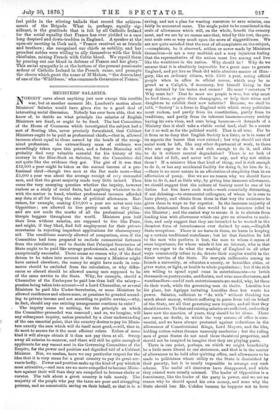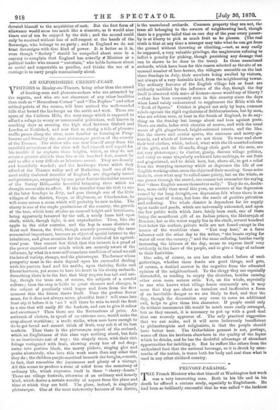MINISTERS' SALARIES.
NOBODY cares about anything just now except this terrible war, but at another moment Mr. Lambert's motion about Ministers' Salaries would have given rise to a good deal of interesting social discussion. Nobody has ever been able, that we know of, to decide on what principle the salaries of English Ministers are fixed, or ought to be fixed. The last Committee of the House of Commons which investigated the subject had a sort of floating idea, never precisely formulated, that Cabinet Ministers ought to be paid as professional chiefs,—that is, allowed incomes about equal to those earned by the heads of the recog- nized professions. An extraordinary mass of evidence was accordingly taken upon this point, and a future Macaulay will probably find very valuable material for his history of the century in the Blue-Book on Salaries, but the Committee did not quite like the evidence they got. The gist of it was that £12,000 a year might be taken as the normal income of a pro- fessional chief—though two men at the Bar made more—that £5,000 a year was about the average receipt of very successful men, and that the great majority made very little indeed. Then came the very annoying question whether the inquiry, however curious as a study of social facts, had anything whatever to do with the matter in hand, whether professional incomes afforded any data at all for fixing the rate of political allowances. Bar- risters, for example, making £10,000 a year are never sent into Opposition ; are allowed to live pretty much as they like ; and are not made the marks of all the professional philan- thropic beggars throughout the world. Ministers pass half their lives without salaries, are supposed to live like Peers, and might, if they liked, find full employment for their private secretaries in rejecting impudent applications for eleemosynary aid. The conditions scarcely allowed of comparison, even if the Committee had been prepared to exclude commercial fortunes from the calculation ; and to decide that Principal Secretaries of State ought to be paid like average professionals, and not like the exceptionally successful. There seems no reason why, if the fixed datum to be taken into account is the money a Minister might have earned elsewhere, the money he might have made in com- merce should be excluded from the calculation, or why differ- ences so absurd should be allowed among men supposed to be of the same service to the State. Why, for example, should a Chancellor of the Exchequer be paid less than half the salary— pension being taken into account—of a Lord Chancellor, or several Ministers be paid like Under-Secretaries, or some Ministers be allowed residences and others none, or pensions be granted accord- ing to private income and not according to public service,—why, in fact, should any one existing arrangement continue to exist?
The inquiry came to nothing, for the principle on which the Committee proceeded was unsound ; and so, we imagine, will any subsequent inquiry, unless preceded by a clear understanding of the one essential point, that the country desires to pay its Minis- ters exactly the sum which will do itself most good,—will, that is, do most to secure for it the most efficient rulers. Rulers of some kind it will always obtain if it does not pay them at all. Sweep away all salaries to-morrow, and there will still be quite enough of applicants for any vacant seat in the Governing Committee of the Empire, for the power and position and dignified toil of a Cabinet Minister. Nor, we confess, have we any particular respect for the idea that it is very mean for a great country to pay its great ser- vants badly. Power and position make up the kind of pay which.is most attractive,—and men are no more compelled to become Minis- ters against their will than they are compelled to become clerks or curates. The talk about a great country is talk merely. The majority of the people who pay the taxes are poor and struggling persons, and no conceivable saving on their behalf, so that it be a saving, and not a plan for wasting resources to save salaries, can fairly be accounted mean. The single point to be considered is the scale of allowances which will, on the whole, benefit the country most, and we are by no means sure that, tried by this test, the pre- sent scale errs so very much upon the score of niggardliness. We are not quite satisfied that the root of all complaints on the subject, —complaints, be it observed, seldom or never made by Ministers themselves—is not a very snobbish and a very injurious feeling that the representative of the nation must live among and live like the wealthiest in the nation. Why should he ? Why do we assume that it is absolutely impossible for a great man to govern England, and yet live as Deak did while absolute master of Hun- • gary, like an ordinary citizen, with £300 a year, seeing official people when in office in official rooms, which may be as grand as a Caliph's, if necessary, but himself living in the way dictated by his tastes and means? He must " entertain "? Why must he? That he must see people is true, but why must he feed them, or give them champagne, or help their wives and daughters to exhibit their new toilettes? Because, we shall be told, " Society" is a force in England with which every politician must reckon, and partly from its constitution, partly from its traditions, and partly from its inherent baseness—every society having its own vices, and ours being baseness—it demands of a Ministry that it shall take a visible social lead, shall be a centre for it as well as for the political world. That is all true. Far be it from us to deny that English Society is a force, or is in some of its aspects the basest that ever existed ; but why should not that social work be left, like any other department of work, to those who are eager to do it and rich enough to do it, and able to dp it without mental degradation? There is no lack of that kind of folk, and never will be any, and why not utilize them ? If a minister likes that kind of thing, and is rich enough to do it, or has any accidental facility for doing it, let him do it ; —there is no more nature in an affectation of simplicity than in an affectation of pomp. But we see no reason why we should force him to do it, and as little why, by giving him immense allowances, we should suggest that the culture of Society must be one of his duties. Let him leave such work—work essentially distracting, if not debasing—to ornamental colleagues, of whom he is sure to have plenty, and obtain from them in that way the assistance he gives them in ways so far superior. In the immense majority of cases, detachment from all that would be an immense relief to the Minister ; and the easiest way to secure it is to abstain from loading him with allowances which can give no stimulus to ambi- tion, and only suggest that they are intended to be wasted in the dreariest form of luxuriousness ever devised by man,—English State receptions. There is no harm in them, no harm in keeping up a certain traditional stateliness ; but let that function be left to the men who perform it best, the men to whom it seems of some importance, for whose minds it has an interest, who in that way are eager to do what the wealthy of England in all other ways consistently refuse to do, devote their surplus wealth to the direct service of the State. No marquis millionaire among us founds a university, or educates a county, or beautifies cities, or gives water, or light, or health to whole populations ; but if the rich are willing to spend equal sums in entertainments—to lavish thousands on pastrycooks, and florists, and wine manufacturers, and waxchandlers—and if such entertainments are useful, why, let them do their work, while the governing men do theirs. Lucullus has his place, but Agrippa imitating Lucullus does but waste his power. Salaries, sufficient to "do with" without thinking too much about money, without suffering in purse from toil on behalf of the State, are all that governing men require, and all that they should receive. To that end existing salaries are sufficient, and as they have now the sanction of years, they should be let alone. There are cases, no doubt, in which the very essence of office is cere- monial, and we have always protested against reductions in the allowances of Constitutional Kings, Lord Mayors, and the like, holding cotton-velvet thrones unseemly mockeries ; but the ruling men of great States do not need these theatrical properties, and should not be tempted to imagine that they are playing parts.
There is one point, perhaps, on which we might beneficially be a little more liberal to our statesmen, and that is in the matter of allowances to be held after quitting office, and allowances to be made to politicians whose utility to the State is diminished by their poverty, but it is nearly impossible to arrange any such scheme. The useful old sinecures have disappeared, and while they existed were usually misused. The leader of Opposition is a functionary, like the leader of the party in power, and we see no reason why he should spend his own money, and none why the State should lose Mr. Cobden because he happens not to have devoted himself to the acquisition of cash. But the first form of allowance would seem too much like a sinecure, as it would nine times out of ten be enjoyed by the rich ; and the second could only be received without loss of self-respect at the hands of the Sovereign, who belongs to no party ; and in England we do not trust Sovereigns with that kind of power. It is better as it is, even though " Society " should be compelled about once in a century to complain that England has actually it Minister or a political leader who cannot " entertain," who holds footmen about as useful and respectable as poodles, and thinks the use of a .carriage is to carry people conveniently about.































 Previous page
Previous page